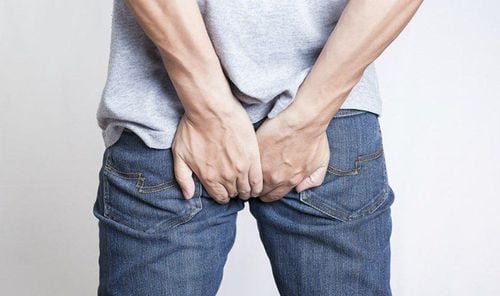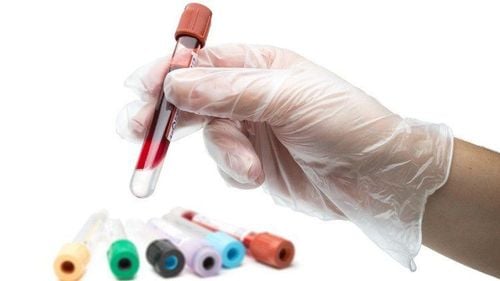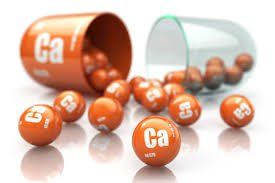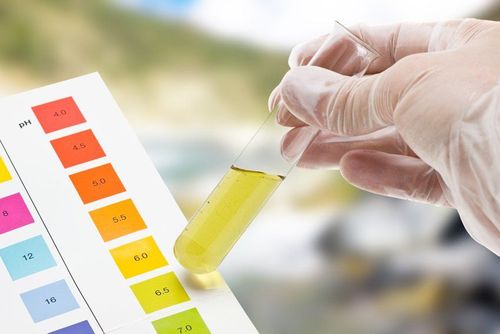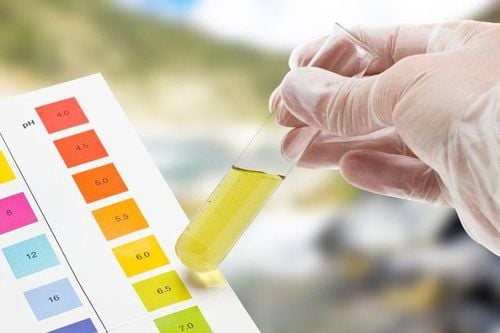This is an automatically translated article.
The article was consulted professionally with Master, Doctor Do Thi Hoang Ha - Doctor of Biochemistry - Laboratory of Laboratory - Vinmec Hai Phong International General Hospital.Urine is a normally sterile liquid secreted by the kidneys and stored in the body in the bladder. Urine calcium determination is an example and is a commonly used test when disturbances in the body's calcium metabolism are suspected.
1. What is urinary calcium determination?
A urine calcium test is done to measure how much calcium is eliminated from the body in the urine. This test is also known as the urinary Ca2+ test.Calcium is one of the most essential and most abundant minerals in the body. All cells in the body use calcium for various vital functions. In particular, the most important is that the body uses calcium to build and repair the structure of bones and teeth, two organs composed mainly of calcium. Among calcium's extra-skeletal functions are involvement in blood clotting, neuromuscular transmission, skeletal and cardiac muscle activation, enzyme activation, and protection of cell membrane integrity and permeability.
Most of the calcium in the body is stored in bones and teeth (accounting for 1 to 2 kg). The remaining calcium is distributed among various tissues and in the extracellular fluid where it plays a vital role in many life-sustaining processes. Calcium is the most abundant metal ion in the body, but only 0.5% of this total is exchanged. When blood calcium levels get too low, the bones release enough calcium to bring blood levels back to normal. Conversely, when calcium levels rise too high, excess calcium will be stored in the bones or eliminated from the body through the urine or digestive tract.
The concentration of calcium in the body depends on the following factors:
The amount of calcium taken from food; Amount of calcium and vitamin D absorbed through the intestines; Phosphate levels in the body; blood protein levels Levels of hormones that play a role in metabolism, such as estrogen, calcitonin, and parathyroid hormone. Blood pH Renal excretion of calcium (99% of glomerular filtration of calcium is reabsorbed in the renal tubules). In the blood, calcium is expressed in two main forms: the protein bound form (inactive form) and the unbound form, circulating in an ionized form – changing the concentration of this calcium form in the blood causes changes. real clinical.

2. When should urine calcium be measured?
Urine calcium concentration is related to the renal excretion of calcium, and is related to:Calcium intake (with a diet with calcium < 200 mg/day, urinary calcium excretion < 200 mg/day). 24h; and when dietary calcium is >1000 mg/day, urinary calcium excretion is 300mg/24h) Renal tubular function Drugs used (using diuretics or salt infusion increase the Urinary calcium) Concentration of vitamin D, parathyroid hormone increases calcium absorption in the renal tubules, calcitonin hormone reduces this process. When there are the following signs, the patient should have a urine calcium test:
Assess whether high urine calcium levels lead to the formation and progression of kidney stones; Assess the amount of calcium ingested or not; Assess the intestinal calcium absorption capacity; Detect the cause of bone destruction to get calcium; Assess renal function in calcium reabsorption; Diagnosis of diseases on the parathyroid glands; In addition, the test of urinary calcium as well as blood calcium also helps to diagnose bone diseases, cancer, hematology, pancreatic diseases, ...
3. How to perform a urine calcium test
To prepare for a calcium urine test, your doctor may direct you to stop taking certain medications that can affect both urine and blood calcium levels, causing false positives in the test results. In addition, you may also be given dietary instructions with a determined calcium intake for several days prior to the test. If a urine calcium test is needed in an infant, parents will also be instructed on how to collect a urine using specialized urine collection bags.A urine calcium test is performed on a urine sample drawn from all urine collections over a 24-hour period. Therefore, the patient should collect all urine from one time point today to that time point the next day into a container provided in advance. The patients then canned and refrigerated them for a 24-hour collection period. On the box, it is necessary to clearly note the patient's name as well as the start and end time and return it to the medical staff.
4. Meaning of urine calcium test results
4.1. Normal results
The amount of calcium in the urine of a person eating a normal diet is 100 to 300 milligrams per day (mg/day). If the diet is low in calcium, urine calcium levels will also decrease, to only 50 to 150 mg/day.4.2. Abnormal results
If urine calcium levels are abnormally high, it could be a sign of:Hyperparathyroidism: When the parathyroid gland produces too much parathyroid hormone, massive amounts of calcium in the bones are released. In addition, the patient will feel fatigue, back pain and bone pain for a long time; Milk alkaline syndrome: Consequences of taking too much calcium, common in older women taking calcium to prevent osteoporosis; Idiopathic hypercalciuria : Too much calcium in the urine for no reason; Sarcoidosis: A disease that causes prolonged inflammation in the lymph nodes, lungs, liver, eyes, skin, or other tissues; Renal tubular acidosis: High levels of acid in the blood because the kidneys are unable to excrete acids in the urine; Vitamin D toxicity: Absorption of too much vitamin D into the body; Using loop diuretics: This drug increases urine production and causes a tendency to excrete calcium; Kidney failure: The kidneys lose the ability to reabsorb calcium into the bloodstream. Breast cancer Fanconi syndrome, Cushing's syndrome, Page's disease, Wilson's disease Glucocorticoid excess, Types of lung cancer, metastatic cancer (especially bone metastases), multiple myeloma, Osteoporosis If calcium levels abnormally low urine levels, which can be a sign of:
Malabsorption disorders: For example, vomiting or diarrhea, because the nutrients in the food are not digested properly; Vitamin D deficiency: The body cannot absorb calcium; Hypoparathyroidism: This condition causes the parathyroid gland to not produce enough hormones to keep calcium and phosphorus levels at physiological levels; Use of thiazide diuretics: This drug reduces calcium in the urine, causing calcium to rise in the blood. Renal osteodystrophy in patients with kidney failure It is important to note that urine calcium tests do not provide information about bone quality, structure, or health. Instead, to diagnose osteoarthritis, it is necessary to take X-rays and measure bone density instead of urine tests.

Vinmec International General Hospital is one of the hospitals that not only ensures professional quality with a team of leading medical doctors, modern equipment and technology, but also stands out for its examination and consultation services. comprehensive and professional medical consultation and treatment; civilized, polite, safe and sterile medical examination and treatment space. Customers when choosing to perform tests here can be completely assured of the accuracy of test results.
Please dial HOTLINE for more information or register for an appointment HERE. Download MyVinmec app to make appointments faster and to manage your bookings easily.





